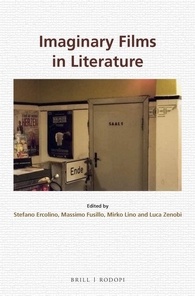
Stefano Ercolino, Massimo Fusillo, Mirko Lino & Luca Zenobi (éds), Imaginary Films in Literature
Amsterdam: Brill, Rodopi, coll.«Textxet: Studies in Comparative Literature», 2016.
EAN13: 9789004306325 / E-ISBN: 9789004306332
226 pages
72.00 EUR
Présentation de l'éditeur
Since cinema is a composite language, describing a movie is a complex challenge for critics and writers, and greatly differs from the ancient and successful genre of the ekphrasis, the literary description of a visual work of art. Imaginary Films in Literature deals with a specific and significant case within this broad category: the description of imaginary, non-existent movies – a practice that is more widespread than one might expect, especially in North American postmodern fiction. Along with theoretical contributions, the book includes the analyses of some case studies focusing on the borders between the visual and the literary, intermedial practices of hybridization, the limits of representation, and other related notions such as “memory”, “fragmentation”, “desire”, “genre”, “authorship”, and “censorship”.
Stefano Ercolino, Ph.D. (2013), University of L’Aquila, is Assistant Professor of Comparative Literature at Underwood International College, Yonsei University (Seoul, Korea). He is the author of The Novel-Essay, 1884-1947 (Palgrave Macmillan, 2014) and The Maximalist Novel: From Thomas Pynchon’s “Gravity’s Rainbow” to Roberto Bolaño’s “2666” (Bloomsbury, 2014; Bompiani, 2015).
Massimo Fusillo, Ph.D. (1987), University of Calabria, is Professor of Comparative Literature at the University of L’Aquila (Italy), and member of the Executive Council of the International Association of Comparative Literature. He is the author of Estetica della letteratura, (Il Mulino, 2009; Machado, 2012) and Feticci (Il Mulino, 2012; Champion, 2014).
Mirko Lino, Ph.D. (2010), University of L’Aquila, is Adjunct Professor of Film History and Literary Criticism at the University of L'Aquila (Italy) and Research Affiliate in Cinema and Media Studies at the University of Palermo (Italy). He has published the monograph L’apocalisse postmoderna tra letteratura e cinema: Catastrofi, oggetti, metropoli, corpi (Le Lettere, 2014).
Luca Zenobi, Ph.D. (2004), University of Pisa, is Assistant Professor of German at the University of L’Aquila (Italy). Among his most recent publications, La natura e l’arte: Interpretazione del reale ed estetica della libertà nel pensiero di Diderot e Schiller (ETS, 2005), and Faust: Il mito dalla tradizione orale al post-pop (Carocci, 2013).
Table des matières
Acknowledgements
Notes on Contributors
Introduction
Massimo Fusillo
The Aesthetics of Imaginary Films
Notes Toward a Theory of Cinematic “Ekphrasis”
James A. W. Heffernan
The Killing Vision: David Foster Wallace’s Infinite Jest
Stefano Ercolino
Hybridizations
“Writing The Making Of”: A New Literary Genre?
Jan Baetens
“A Film Run in Installments”: Memory and Cinema in Tom McCarthy’s Remainder
Vincenzo Maggitti
Towards Other Worlds, Towards Other Meanings: Screenplays on the Edge of the Plot
Clotilde Bertoni
Paul Auster, Hector Mann and The Book of Illusions
Anna Scannavini
Mañana en la batalla piensa en mí: Cinema, Theatre, Television and the Creative Force of the Word
Federica Ivaldi
Failed Cinema
“Quo Vadis – Kino?” Kurt Pinthus and the Theoretical Debate on the Birth of Cinema in Germany
Luca Zenobi
The Outer Life of Martin Frost, or Never Make an Imaginary Film
Silvia Albertazzi
On Conceiving (and Sometimes Not Succeeding in Making) a Film
Giulio Iacoli
The Politics of Imaginary Films
The “Quasi-Truth”. Literature and Cinema in Starnone and Piccolo
Gianluigi Simonetti
Breakfast at the Prater. Christopher Isherwood, His Women and Men
Gian Piero Piretto
The Technological Imagery
Alpdrücken and the Spectrum of Power in Gravity’s Rainbow by Thomas Pynchon
Mirko Lino
Pattern Recognition: The “Postcinema” Seen by William Gibson
Simone Arcagni
Bibliography
Index